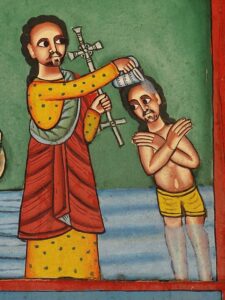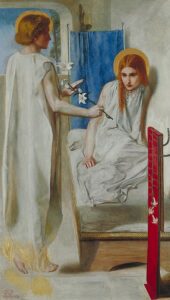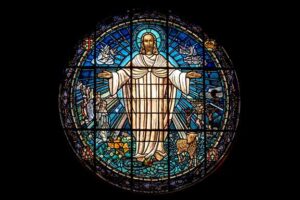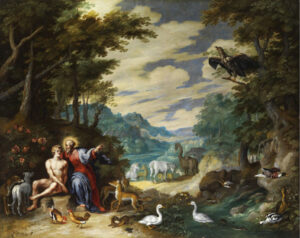 One of the things I try to do when I read the stories of Jesus in the Gospels, when he uses an odd or striking metaphor like “I will make you fishers of people”[1] or, as it is put in this Gospel, “from now on you will be catching people,”[2] is to figure out if he’s referring back to Law or the Prophets, and whether it might be the lectionary’s choice for a first lesson. Sometimes that helps me figure out whether there is a thematic link between the lessons and, if so, what it’s supposed tell us, but unfortunately that’s not the case today. Jesus doesn’t seem to have had Isaiah in mind when he summoned Peter and his business partners.
One of the things I try to do when I read the stories of Jesus in the Gospels, when he uses an odd or striking metaphor like “I will make you fishers of people”[1] or, as it is put in this Gospel, “from now on you will be catching people,”[2] is to figure out if he’s referring back to Law or the Prophets, and whether it might be the lectionary’s choice for a first lesson. Sometimes that helps me figure out whether there is a thematic link between the lessons and, if so, what it’s supposed tell us, but unfortunately that’s not the case today. Jesus doesn’t seem to have had Isaiah in mind when he summoned Peter and his business partners.
So for the past week or so, I’ve been pondering what might be the reason for putting the Isaiah reading –– which, although it comes in the sixth chapter, is the story of Isaiah’s initial call to be a prophet –– together with Luke’s version of Jesus recruiting Simon Peter and the sons of Zebedee, James and John, to be disciples. The simple answer, of course, is that they are both stories of calls to ministry, but they are so different!

 Again this week as last, our first reading today is from the First Book of Kings and like last week’s, it is a prayer spoken by King Solomon. Last week, it was a private prayer spoken in a dream late at night. Today, it is a public prayer. As long as it was, this reading is just a small part of the dedicatory prayer that Solomon offered when the Temple was finished and consecrated. In it, Solomon asks an important question, “[W]ill God indeed dwell on the earth?”
Again this week as last, our first reading today is from the First Book of Kings and like last week’s, it is a prayer spoken by King Solomon. Last week, it was a private prayer spoken in a dream late at night. Today, it is a public prayer. As long as it was, this reading is just a small part of the dedicatory prayer that Solomon offered when the Temple was finished and consecrated. In it, Solomon asks an important question, “[W]ill God indeed dwell on the earth?” Our gospel reading this morning is taken from the Fourth Gospel, the Gospel according to John, which I’m sure you know is the sort of odd-man-out of the gospels. The other three gospels, the so-called Synoptic Gospels (a Greek word meaning that they see the Jesus story in the same way), pretty much agree and present the events of Jesus’ ministry in the same order over a one-year time-line. John tells the story in a completely different way, with a three-year time span and a different order of events.
Our gospel reading this morning is taken from the Fourth Gospel, the Gospel according to John, which I’m sure you know is the sort of odd-man-out of the gospels. The other three gospels, the so-called Synoptic Gospels (a Greek word meaning that they see the Jesus story in the same way), pretty much agree and present the events of Jesus’ ministry in the same order over a one-year time-line. John tells the story in a completely different way, with a three-year time span and a different order of events.  There’s a story about a pastor giving a children’s sermon. He decides to use a story about forest animals as his starting point, so he gathers the kids around him and begins by asking them a question. He says, “I’m going to describe someone to you and I want you to tell me who it is. This person prepares for winter by gathering nuts and hiding them in a safe place, like inside a hollow tree. Who might that be?” The kids all have a puzzled look on their faces and no one answers. So, the preacher continues, “Well, this person is kind of short. He has whiskers and a bushy tail, and he scampers along branches jumping from tree to tree.” More puzzled looks until, finally, Johnnie raises his hand. The preacher breathes a sigh of relief, and calls on Johnnie, who says, “I know the answer is supposed to be Jesus, but that sure sounds an awful lot like a squirrel to me.”
There’s a story about a pastor giving a children’s sermon. He decides to use a story about forest animals as his starting point, so he gathers the kids around him and begins by asking them a question. He says, “I’m going to describe someone to you and I want you to tell me who it is. This person prepares for winter by gathering nuts and hiding them in a safe place, like inside a hollow tree. Who might that be?” The kids all have a puzzled look on their faces and no one answers. So, the preacher continues, “Well, this person is kind of short. He has whiskers and a bushy tail, and he scampers along branches jumping from tree to tree.” More puzzled looks until, finally, Johnnie raises his hand. The preacher breathes a sigh of relief, and calls on Johnnie, who says, “I know the answer is supposed to be Jesus, but that sure sounds an awful lot like a squirrel to me.” When I find myself in times of trouble,
When I find myself in times of trouble, Our gospel lesson is the shortened version of Jesus’ commission to the twelve as he sends them out to do missionary work. As he continues with their instructions he tells them, “I am sending you out like sheep into the midst of wolves; so be wise as serpents and innocent as doves,”
Our gospel lesson is the shortened version of Jesus’ commission to the twelve as he sends them out to do missionary work. As he continues with their instructions he tells them, “I am sending you out like sheep into the midst of wolves; so be wise as serpents and innocent as doves,” It’s the last Sunday of the Christian year, sort of a New Year’s Eve for the church. We call it “the Feast of Christ the King” and we celebrate it by remembering his enthronement. Each year on Christ the King Sunday we read some part of the crucifixion story. As Pope Francis reminded the faithful in his Palm Sunday homily a few years ago, “It is precisely here that his kingship shines forth in godly fashion: his royal throne is the wood of the Cross!”
It’s the last Sunday of the Christian year, sort of a New Year’s Eve for the church. We call it “the Feast of Christ the King” and we celebrate it by remembering his enthronement. Each year on Christ the King Sunday we read some part of the crucifixion story. As Pope Francis reminded the faithful in his Palm Sunday homily a few years ago, “It is precisely here that his kingship shines forth in godly fashion: his royal throne is the wood of the Cross!”
 Come Holy Spirit, Comforter, Spirit of Truth,
Come Holy Spirit, Comforter, Spirit of Truth,

